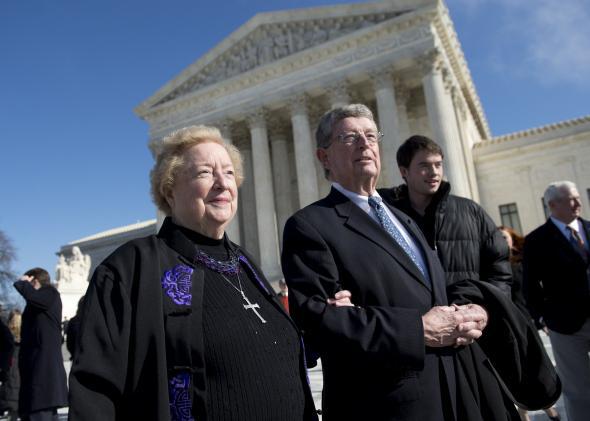Abortion clinics received a major blow on Thursday, when the Supreme Court overturned a law in Massachusetts that gave patients and clinic workers a 35-foot buffer zone around the entrance of clinics, allowing them a few seconds to get into the clinic without having to be harassed by anti-choice protesters. In a surprising unanimous decision, the court found in McCullen v. Coakley that the buffer zone is an unjustified infringement on freedom of speech and told the state of Massachusetts to find another way to keep the peace and allow women to get into abortion clinics without feeling like they have to mace a bunch of people to get free passage (my words, not theirs).
The anti-choice strategy of choosing plaintiffs who are little old ladies and not scary protesters seems to have worked. The court was skeptical that these women presented enough of a problem to justify such a dramatic restriction of public spaces, such as sidewalks around clinics. According to SCOTUSblog, though, the decision is somewhat narrow. It doesn’t strip Massachusetts of all its rights to control aggressive protesters, but instead instructs the state to come up with more tailored ways, such as court orders geared to specific clinics, to control the problem. And police officers still have the authority to keep protesters from physically blocking clinic entrances.
Even though the decision is moderate in its tone and continues to give states authority to find other ways to protect women trying to get abortions, there is plenty of reason to be worried that it will embolden clinic harassers to start upping their games. One reason the areas around Massachusetts clinics are relatively peaceful is because protesters had to stand back a little. Ironically, it’s that peacefulness that allowed the court to argue that the buffer zone is an overkill. As I detailed here at Slate back in January, the clinics in Massachusetts had a particularly bad history prior to the buffer zone, even compared to some red state clinics, of protesters pretending to be police officers, screaming in women’s faces, and initiating physical altercations. In 1994, one protester even took it upon himself to murder a clinic worker.
Supreme Court decisions are about more than just the law and what it does and does not allow. They also help set social expectations. While anti-choicers continue to believe that they own women’s uteruses, their sense that they are also entitled to control women’s movements has declined since the ‘90s, at the height of clinic blockades and violence. This decision may be limited legally, but could very well be taken by the anti-choice movement as “permission” to reassert themselves and their physical presence. If past is any indicator, the frustration of being up close and personal with a woman who is about to have an abortion but being unable to actually stop her can sometimes spiral out of control.
